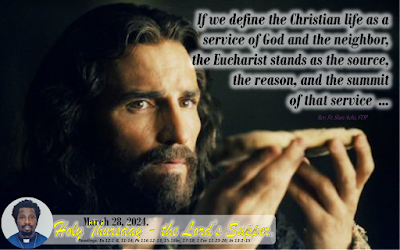THE EUCHARIST, SOURCE, AND SUMMIT OF CHRISTIAN LIFE.
March 28, 2024.
Holy Thursday - the Lord’s Supper – B.
Readings: Ex 12:1-8, 11-14; Ps 116:12-13, 15-16bc, 17-18; 1Cor 11:23-26; Jn 13:1-15.
“For as often as you eat this bread and drink the cup, you
proclaim the death of the Lord until he comes.” 1 Cor 11:26
An Indian proverb says: “Service is greatness.” A Congolese
proverb adds: “A river that forgets its source will soon dry out.”
The Catechism of the Catholic Church, quoting Lumen Gentium
11, says about the Holy Eucharist: "The Eucharist is "the source and
summit of the Christian life." "The other sacraments, and indeed all
ecclesiastical ministries and works of the apostolate, are bound up with the
Eucharist and are oriented toward it. For in the blessed Eucharist is contained
the whole spiritual good of the Church, namely Christ himself, our Pasch."
CCC 1324
Therefore, we are assembled to celebrate today what gives
strength, meaning, and direction to our lives as Christians. We celebrate the
bond of our communion and mission in the Church. Through the Holy Eucharist, we
are made partakers of Christ, and so brothers of each other. The Eucharist is
the cement of our unity and communion. It is the sacrament of community.
Undoubtedly, it is the truly instituted sacrament by Jesus with the
authoritative divine order: “Do this in remembrance of me.” So, by celebrating
the Holy Eucharist and by partaking in the communion of the Body and Blood of Christ,
we fulfill his command.
In the Holy Eucharist, Jesus not only gives himself to feed
our corporal and spiritual needs, but he also teaches us the way to service and
humility. The context of the institution of the Holy Eucharist is the most
expressive of that. Through the act of washing the feet of his disciples, Jesus
teaches us that we have to serve one another and do so in the greatest
humility.
We live in a world and in societies where everyone makes an
idol of himself. We think ourselves superior to others. When given a chance for
a position of authority, we use it to abuse and subdue others.
I always look and reflect on how politicians get into power
and what they become once in the position they dreamed of. Many of them, during
campaigns, show themselves as public servants, ready to walk and eat even with
the beggar and the lowliest. But once elected, they become patrons and kings
and queens with servants caring for them. Jesus, the greatest of all leaders,
had no servants. Not only did he have none, but he made himself servant of all.
"If I, therefore, the master and teacher, have washed your feet, you ought
to wash one another’s feet. I have given you a model to follow, so that as I
have done for you, you should also do.”
We thus have a model of a perfect servant, Jesus our Lord
and Master. May our partaking of His Body help us to offer ourselves to our
brothers and sisters and by drinking his blood, be ready to shed our own blood
for the life of others. The Eucharist must always stand for us as a sacrament
of service, humility, and love.
If we define the Christian life as a service of God and the
neighbor, the Eucharist stands as the source, the reason, and the summit of
that service. For it asks for total self-giving as Jesus did.
In the Gospel, John does not insist so much on the
Eucharistic Institution, but on the reality of service. John wants us to see
that the washing of the feet and the Eucharist are interrelated. Washing of
feet is Eucharistic. And as per a beautiful coincidence, Jesus concluded both
the institution of the Eucharist and the Washing of the feet of his disciples
with instructions. After blessing the bread and wine, he said, “Do this in
remembrance of me” (1 Cor 11:24) and after washing their feet he said, “As I
have done for you, you should also do.” (Jn 13:15) So, the Eucharist is ordered
to service, and the service to our brothers and sisters, in order to be total
requires that we be fed on Jesus, the Eucharistic Bread and be ready to imitate
him, love to the extreme, love without counting the cost.





Comments
Post a Comment